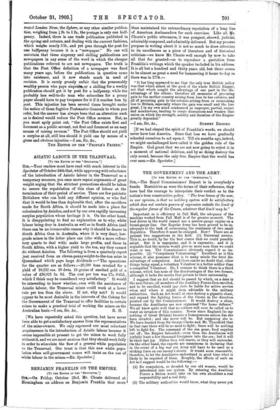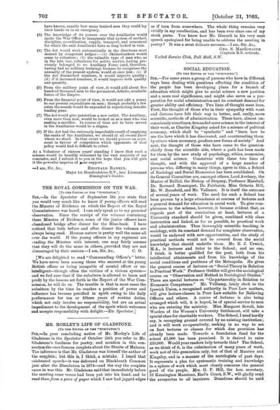THE GOVERNMENT AND THE ARMY.
[TO THE EDITOR OF TUE 31.110TET04.1 Sin,—The Royal Commissioners' Report is in everybody's hands. Restrictive as were the terms of their reference, they have had the courage to interpolate their verdict as to the nation's true constructive policy. " The true lesson of the war, in our opinion, is that no military system will be satisfactory which does not contain powers of expansion outside the limit of the regular forces of the Crown, whatever that limit may be."
Important as is efficiency in Pall Mall, the adequacy of the machine worked from Pall Mall is of far greater moment. The best driver in the world cannot use a narrow-gauge engine on a broad-gauge line. Our Regular Army has been proved to be in- adequate to the task of overcoming the resistance of two small Republics. Therefore it must be enlarged. How ? There are at present two suggestions in the field. (1) Universal service. This is, no doubt, by far the best course that we could possibly adopt. But it is unpopular, and it is expensive ; and it is arguable that the system would give us more men than we could want or use. The Commissioners obviously regard it as Im- possible. (2) "Compulsory Volunteering." Excellent as is this scheme, it also possesses what is to many minds the fatal dis- advantage of compulsion. And there can be no doubt that. other things being equal, a voluntary Volunteer is a better soldier than a compelled Volunteer. Sir, I venture to think there is a third scheme, which has none, of the disadvantages of the two former, although it lacks the merits that pertain to their universality.
I suggest that an Act should be passed by which, on a date in the near future, all members of the Auxiliary Forces then enrolled, and to be enrolled, would ipso facto be liable for active service when and where it might seem advisable to the military authorities. Such an Act would at once destroy a gigantic sham, and expand the fighting forces of the Crown in the direction pointed out by the Commissioners. It would destroy a sham, because the Auxiliaries are now organised " for home defence." We all know quite well that no soldiers will ever be called on to resist an invasion of this country. Never since England (to say nothing of Great Britain) became a homogeneous nation has she been invaded ; and she never will be. But supposing she is. We have learned from Sir George Clarke and Mr. Thursfield that in that case there will be no need to fight; there will be nothing left to fight for. The command of the sea gone; food supplies cut off ; the Empire beheaded,—even then the Auxiliaries will joyfully hunt a few thousand foreigners into the sea ; but it will be their last joy. Either they will starve, or they will surrender. On the other hand, the experts are unanimous in declaring that in the event of a big war our Army will have to be used as a striking force on our enemy's shores. It would seem reasonable, therefore, to let the Auxiliaries understand in good time what is likely to be required of them. Roughly, the effects of such an Act as I suggest would be the following :— (1) No compulsion, so dreaded by our old women, would be introduced into our system. By entering the Auxiliary Forces a Briton would take on his own shoulders a real responsibility and a real duty.
(2) The military authorities would know, what they never yet have known, exactly how many trained men they could lay their bands on in an emergency.
The knowledge of its powers over the Auxiliaries would incite the War Office to inaugurate that system of method, discipline, co-ordination, supply, transport, and armament for which the said Auxiliaries have so long looked in vain.
(4) The Act would work automatically in the directions most desired by competent judges :—(a) Skrimshankers would cease to volunteer; (b) the valuable type of man who, as in the late war, volunteers for active service, having pre- viously belonged to no Auxiliary Force (and, therefore, having had no military training) because he recognises the unreality of the present system, would at once join ; (c) if the Act diminished numbers, it would improve quality ; (d) if it increased numbers, it would improve both quality and quantity.
From the military point of view, it would add about five hundred thousand men to the permanent, definite, available forces of the Empire.
From the financial point of view, it would not add a penny to our present expenditure on men ; though probably a few extra thousands would be expended in superseding muzzle- loading guns.
The Act would give patriotism a new outlet. The Auxiliary, even more than now, would be looked on as a man who was making a sacrifice. In course of time not to have served in the Auxiliaries would be a stigma.
If the Act had the extremely improbable result of emptying the ranks of the Auxiliaries, we should at all events know where we stood. In that event we should possess an argu- ment in favour of compulsion which opponents of that policy would find it difficult to rebut.
As a Volunteer of sixteen years' standing I know that such a scheme would be heartily welcomed by the vast majority of my comrades, and I submit it to you in the hope that you will give it the powerful impetus of pour support.
(3)
Major 1st Herefordshire R.V., late Lieutenant Rimington's Guides.



















































 Previous page
Previous page